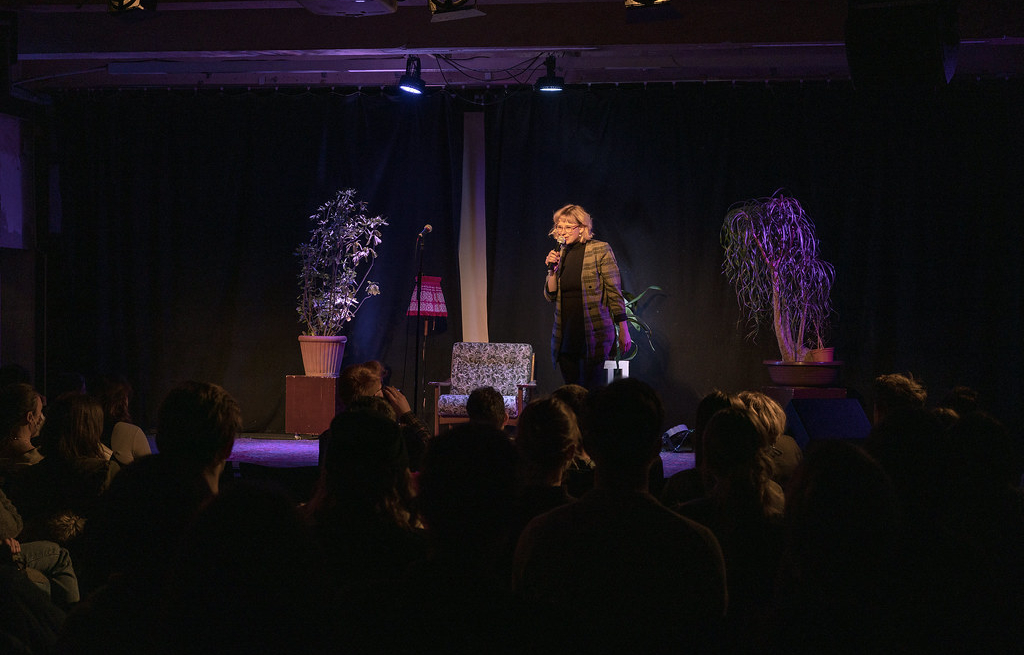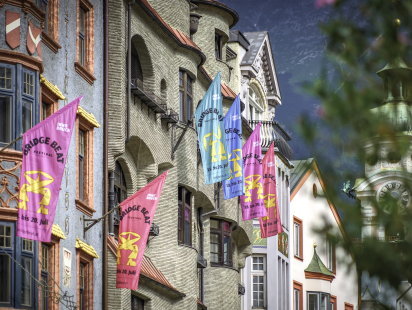
The monthly Comedy Night at Die Bäckerei has quickly established itself as one of the best nights out around. I’ve attended the past four and it’s been absolutely brilliant every time. The headliners have been from all over but are always in English. So, whether it’s Deo Katunga telling you what life was like growing up in Bulgaria with a Congolese dad, or Kat Nip explaining why she had to leave Poland, it’s a loosely educational experience in international relations, all done through the medium of chuckling until you feel like chucking up. But in a fun way, obviously.
The ‘support act’ is an open mic session in which anyone can sign up for a ten minute slot. These have been in a mixture of German and English. So if your Deutsch is as bad as mine (really bad) at least you don’t have to wait too long for the next act.
Die Bäckerei – so named as it used to be a bakery – is a cultural centre on Dreiheiligenstrasse, not far from the centre of Innsbruck. It offers ‘a platform for all imaginable types of creative self-expression’. I’ve always found it a charming venue with a welcoming atmosphere.
I recently talked to Baiba (originally from Latvia), who’s worked at Die Bäckerei for the past eight years, and Polona (from Slovenia), who’s been in Innsbruck for the past six months and hosted the Comedy Night on the past three occasions. Bready? Let’s go!
How did it all begin?
Baiba: It escalated very quickly. Die Bäckerei is known as a community space. We have cluster of events like the poetry slam and the open mic night that are very popular, where people can participate and try things out. In Covid times, during lockdown, I decided I wanted to be a comedian. So I googled to see if there are any comedy events around, and there were none. Nothing. So I talked with a colleague about doing something at Bäckerei, and that was about three years ago. Then I googled ‘how to MC a comedy show’, ‘how do comedy shows work’, ‘how many open mic-ers …’ and so on. The first couple of times it was just open mic-ers, basically me begging my friends to perform. Some of the people I convinced are still performing now and are really good. And at some point we saw that it could be going somewhere – that it was actually quite funny, people were enjoying it. Even though, at the beginning, the quality wasn’t so great because we didn’t have a headliner.
When did it start exactly?
Baiba: That was the summer of 2020, so there were a lot of Covid restrictions. I got the feeling that summer that Die Bäckerei events – the open mics and the comedy nights – were for people to connect with their friends again … you could see that people were really excited to talk to the comedians. We’d always go out together afterwards. It was a very healing experience for everyone, including me. It grew from that.
Has it always been a monthly event?
Baiba: In the beginning it was once every two or three months because I wanted to see if it worked. Then I decided monthly would be best. Commit to doing it monthly and really push the promotion because that’s how you raise the awareness. Then I started to get headliners and it escalated very quickly. I went to Rififi (a bar in Innsbruck that has since closed down) and they, very occasionally, held comedy nights. There was a guy from Sri Lanka – Malinda Perera – who performed there and he’s very present in the Vienna comedy scene. After the show we had a drink and a chat. Later he wrote to me because, with Rififi having closed, he was looking for another venue in Innsbruck. So he became our first headliner. That night went well, so he told all his friends in Vienna that it’s a good gig, with lots of people … over 100 people, which is a big crowd if you’re used to performing to 20 or 30 in Vienna. I told Malinda, in Innsbruck, it’s different – it’s an event, because it’s the only regular comedy night. People dress up, they buy tickets in advance, they invite their friends to come. Almost like going to theatre more than a comedy club.
Polona: And the headliners seem to have a great time because word really spread from them.
It seems like most of the headliners live in Berlin …
Baiba: The European comedy scene is actually very small, so they all know each other. Most are based in Amsterdam, Barcelona or Berlin. And I went to Berlin for a week to watch a lot of comedy shows see how it all works there.
Did you approach some of the comedians after watching shows there?
Baiba: Yeah, it’s a very friendly bubble … the comedians are all friends. And suddenly, we’re in … almost like part of the family.
Polona: With comedians, they tend to be more approachable, they’re just hanging around … there are no real barriers like in the theatre or with music.
Baiba: For us, we have to hit the sweet spot where we can get a good quality comedian who’s not too big yet. Someone who’s too big would make more financial demands, it wouldn’t be worth it for us to put them on, with the costs we have to cover.
Polona: They have to just hit that lovely little sweet spot! Someone who’s experienced enough to have a really good show together, but not so well known that it wouldn’t pay off (for us).
Which is good, I think. You get the up and coming comedians who are already really good but hungry to get better. Personally, how did you find performing?
Baiba: I find it a very healing, very freeing experience. In Covid times I had a lot of stuff going on … everything felt wrong. But when comedians from different places tell their stories you find out a lot of things – political, social. And I thought, ‘oh, after this set everyone will know what’s going on (in my personal life) ...’ But you do it once and it becomes addictive because of the adrenaline rush. I felt like, ‘I want more!’
Polona, how long have you been doing stand up comedy?
Polona: The very first time was when I hosted the November show.
Really?! You seem so comfortable on stage …
Polona: I am comfortable on stage. I’ve been doing theatre for a while, so I’ve been on stage a lot. But comedy is different – there’s no set design, no script, no barrier between you and the audience. It’s just you and a microphone and your demons! But that’s the fun thing – you talk about deep personal things and the audience reacts. And they wouldn’t react unless they recognise what you’re saying. So that makes you think, ‘oh, I’m not crazy!’ To feel like this, because they get it too, it’s wonderfully validating.
A bit like a public therapy session? Or is that going too far?
Polona: Yeah, kind of … I mean, we’re not solving anything! But at least it makes us all feel less alone.
Baiba: One of the best things is getting random emails from people saying, ‘I was at the last comedy night … I think I can do it! Next time can you give me a slot?’
Polona: I like that too with the open mic session as the support. For better or worse, it’s always different. You never know what people are going to come up with.
Is it important that the headliners are English language?
Polona: I don’t know that it’s important, it’s just worked out that way because if you want to tour in Europe you have to do it in English. Even in Berlin, it’s such an international city that if you use German you immediately lose half the audience.
Baiba: I also think it fits for Die Bäckerei that the headliners are in English because this is a space for everyone and we want to be as inclusive as possible.
Polona: Yeah, a fair amount of the open mic-ers are in English too.
Baiba: I can sense there’s a bit of a movement here now. It’s slowly happening … which is the aim in a way.
That’s great. Thanks for talking to me!
Dave Adams, an Australian based in Berlin (of course!), is up next tomorrow, April 13th. He plays piano and sings funny songs. If you want to go, it would be best to get your tickets soon because Die Bäckerei Comedy Nights usually sell out quickly.
Click ‘tickets kaufen’ on this link.
PS: Sorry about the half-baked bread puns.
All photos: © Noemi Montaleone
Rate this article
Show me the location on the map
Welsh-born father of two boys. Innsbruck resident since 2009.
Similar articles
Innsbruck has a new summer festival, and that's a good thing! The first BRIDGE…
A new music festival will conquer Innsbruck from July 18 to 20, 2024 to celebrate summer lightness…
The last stage of the 73rd Tour of Austria ends with a tough climb: with hundreds of…
Two years ago, a friend from New Zealand – Katija – came…










